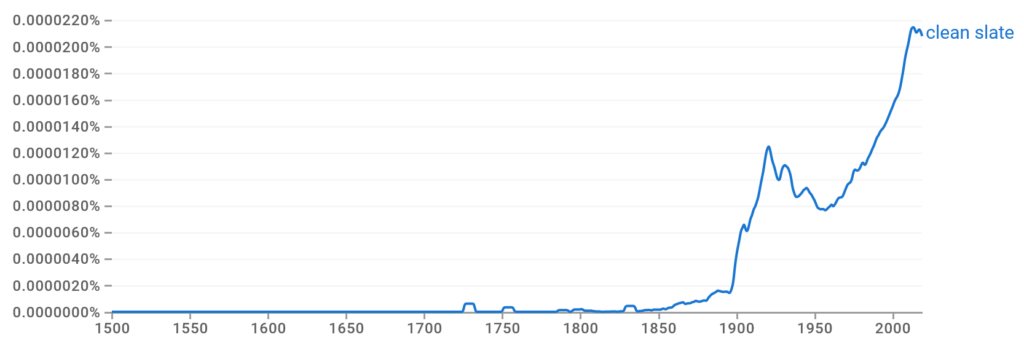Clean slate is an idiom that pertains to starting again freely, without considering past mistakes or failures. Idioms like this are expressions or phrases used figuratively to convey a point, diverging from their literal meanings. Mastering the art of using these intriguing idiomatic expressions enhances the color, vibrancy, and interest in your English language speech and written work.
This article delves into the idiom’s meaning, origin, alternatives, usage in different contexts, and examples of its use. And why not take the fun quiz at the end of the article to test your knowledge of the idiom?

What Does the Idiom Clean Slate Mean?
The idiom start with a clean slate refers to starting anew or having a fresh beginning without any lingering issues or burdens from the past. When someone talks about starting with a clean slate, it means wiping away past mistakes, problems, or obligations and beginning with a fresh and unblemished start.
Cambridge Dictionary defines a clean slate as “a state in which you are starting an activity or process again, not considering what has happened in the past at all.” Merriam-Webster names the idiom clean slate as a noun that means “a person’s record (as from a school or a job) that shows no evidence of any problems, broken rules, etc.: a clean record.”
This expression is often used in various contexts, such as in personal relationships, work situations, or when embarking on a new project. It conveys the idea of leaving behind past difficulties or failures and moving forward with a sense of renewal and a blank canvas for new opportunities.
Variations of Clean Slate
Here are a few variations of the idiom clean slate:
- Fresh slate
- Fresh start
- Square one
- Fresh page
How Is Clean Slate Commonly Used in Context?
Clean slate is an idiom that’s been around since the 1800s, so it’s quite widely known in regular conversation. However, to be sure your audience understands the phrase, always consider the context and various ways you can use it to express a desire to start over.
What Are the Different Ways to Use Clean Slate?
Some ways you can use the idiom clean slate in different contexts include:
- Reconciliation: “We’re so good together; let’s not break up but start over with a clean slate.”
- Starting over: “My relationship breakup hit me hard, so I’m moving to a new city to start over with a clean slate.”
- New beginnings: “My son didn’t do well at his old school. I’m hoping a move to a better one closer to home will allow him to start with a clean slate.”
- Rehab and recovery: “My friend is out of rehab now and clean, so hopefully, she can now wipe the slate clean and start over.”
- Resetting a plan or project: “Our last project was beset with difficulties, but with a new team and fresh ideas, we can start with a clean slate.”
- Financial fresh start: “My boss declared himself bankrupt and had to give up all his assets, but at least that gave him a clean slate to rebuild his life financially.”
Where Can You Find Examples of Clean Slate?
You can find the idiom used widely on TV, in online articles, in books, in movies, and in conversation. Here are a few examples of it being used in some online publications:
Whether it’s an actual desk, a folding TV table or a portion of a dining table, start with a clean slate—with materials you need for that day’s learning set out, and nothing else. (The Daily Gazette)
Creative director Stuart Vevers felt it important to wipe the slate clean and think differently about presenting fashion under such strange new circumstances. (Vogue Magazine)
What Are Some Tips for Using Clean Slate Effectively?
Using the idiom clean slate effectively involves incorporating it into your communication to convey the intended meaning clearly and appropriately. Here are some tips for using the idiom effectively:
- Context matters: Consider the context; it’s often applied where a fresh start or new beginning is possible.
- Clarity in communication: Ensure that the context and idiom usage are clear to your audience. Avoid using it in situations where its metaphorical meaning might be confusing.
- Positive connotations: Use it in situations where an optimistic outlook is appropriate.
- Personal and professional use: Whether you’re talking about personal relationships, work projects, or life changes, the concept of a clean slate is versatile.
- Avoiding negative associations: Be cautious when using the idiom in contexts where a negative connotation might arise. Ensure that the situation genuinely allows for a positive and constructive fresh start.
- Appropriate tone: Consider the tone of the conversation or written piece. The idiom may be more suitable in informal or positive settings than in situations requiring a serious or formal tone.
What Is the Origin of the Idiom Clean Slate?

The phrase clean slate originated during the 19th century. In this era, both students and business establishments commonly used slates and chalk for various purposes. Students performed their written exercises on slates, while bars, shops, and even racetrack bookmakers employed them for record-keeping purposes.
For students, a clean slate would represent a fresh start or a new task; for businesses, it signified settling accounts and starting anew. Similarly, the bookmakers would begin with a clean slate once all bets were placed and the odds were set.
From these varied uses, the expressions start with a clean slate and wipe the slate clean emerged.
How Did the Idiom Evolve Over Time?
Gradually, they transitioned from their literal usage to a more figurative one, symbolizing a fresh start or the elimination of past mistakes or debts. By the mid-19th century, these phrases had become well-established idioms in everyday language, carrying with them a sense of forgiveness and new beginnings.
What Are Some Related Terms to Clean Slate?
Synonyms and antonyms can help provide context for the idiom’s use and clarify its meaning.

Synonyms
- Blank canvas
- New beginning
- Clear path
- Tabula rasa
- New leaf
- Ground zero
- Starting from scratch
Antonyms
- Baggage
- Dirty laundry
- History
- Tarnished record
- Blemished record
- Complicated history
- Shady past
Clean Slate: Test Your Knowledge!
Choose the correct answer.
What Have We Learned About Clean Slate?
We discovered that the idiom clean slate originated in the 1800s when chalk and slate were still used in schools, stores, and other environments. These days, the phrase is used to express someone’s intention to start afresh, unburdened by their past experiences.
This is an informal phrase that you would typically use when chatting casually with your friends and family rather than in a business or academic setting. Learning to use idioms like this can help improve your English language skills and make your expressions more powerful and effective.
Want to know more idioms? Check out some others we covered:
